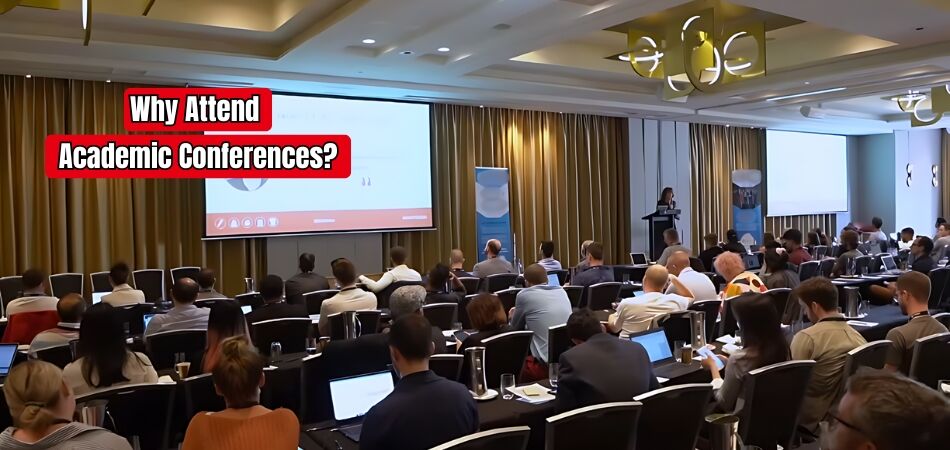Academic conferences offer exciting opportunities for new ideas and collaborations. These events bring together minds from across the globe, all eager to share knowledge and explore cutting-edge research. It’s more than just a gathering – it’s a place to grow and innovate.
So, why attend academic conferences?
Apart from learning opportunities, conferences offer valuable opportunities to network with peers and experts in your field. You’ll stay ahead of industry trends, sharpen your presentation skills, and receive constructive feedback on your work. Plus, it’s a fantastic way to boost your career while experiencing new places and cultures.
Ready to dive deeper? Let’s explore all the reasons why you should make conferences a priority.
How Academic Conferences Affect Various Sectors?
Academic conferences play a huge role in shaping various sectors by sharing knowledge and innovative ideas. They allow professionals to collaborate, inspiring growth and encouraging improvements across fields like healthcare, technology, and environmental sciences. Many experts clear their schedules to attend upcoming international academic conferences to stay current on advancements and strategies. These events create platforms for breakthroughs that influence global standards and enhance sector-wide practices.
Beyond knowledge sharing, academic conferences impact industry trends, sparking research and inspiring policy changes that affect real-world applications. Attendees get valuable insights into sector challenges, finding new solutions through collaboration and discussions. These conferences encourage dynamic exchanges, helping professionals apply innovative ideas to their fields. By fostering such environments, they drive progress across sectors, bringing lasting benefits to industries worldwide.
What to Look for in an Academic Conference?
Choosing the right academic conference can be crucial for your professional growth and networking. It’s important to select one that aligns with your academic interests and career goals. Here are a few key points to consider when making your decision:
- Relevance of Topics: Ensure the conference themes resonate with your research area or professional focus. This alignment can greatly enrich your understanding and contributions.
- Quality of Speakers: High-caliber speakers can provide profound insights and stimulate forward-thinking discussions. Look for experienced professionals who are leaders in their fields.
- Networking Opportunities: Check if the event facilitates networking with peers and industry leaders. Effective networking can open doors to collaborations and career opportunities.
- Workshop and Session Formats: Prefer conferences that offer interactive sessions or workshops. These formats tend to be more engaging and offer practical learning experiences.
As you plan your academic journey, keep these points in mind to choose a conference that will truly benefit your professional development and expand your academic horizons. Choosing wisely can provide you with a treasure trove of knowledge and connections!
Who Should Attend Academic Conferences
Academic conferences are valuable gatherings, offering knowledge-sharing and networking opportunities across various fields. But who truly benefits from attending? Here’s a breakdown of who should consider participating and why.
Established Academics and Researchers
Experienced researchers attend to stay updated on the latest advancements and emerging trends in their field. Engaging in these discussions helps them refine their perspectives and deepen their expertise. Presenting papers allows them to showcase findings and contribute to the community’s knowledge base. Conferences also offer them fresh collaborations and projects, driving future research directions.
Industry Professionals and Practitioners
Professionals working in the field can benefit by understanding recent academic research directly related to their work. They can also gain practical insights to solve challenges and enhance their strategies. Networking at these events often leads to potential collaborations and consulting opportunities with researchers. Attending helps them keep their skills updated and relevant in an ever-evolving industry landscape.
Policymakers and Administrators
For policymakers, conferences offer a direct window into emerging research that can guide effective decision-making. Learning about new studies helps them craft policies that reflect the latest scientific findings. Engaging with researchers allows them to discuss policy needs and expectations in real time. This participation builds a bridge between academic insights and impactful real-world policies.
Graduate Students and Early Career Researchers
Graduate students and early career researchers can gain valuable insights and exposure at academic conferences. Networking with experts allows them to build connections while understanding student costs for academic conferences ensures they can budget effectively. Presenting their work gives them confidence and encourages constructive feedback from knowledgeable attendees. It’s a unique chance to learn industry standards and start their career on a strong note.
Why Attend Academic Conferences?
You can gain insights, make valuable connections, and grow professionally by attending academic conferences. Whether you’re a student or an established professional, conferences offer something for everyone. Here are seven compelling reasons to attend an academic conference.
Networking with Field Experts
Meeting field experts offers you the chance to build valuable connections and expand your professional network. Engaging with seasoned professionals can provide fresh perspectives and stimulate your academic growth. Networking also opens doors to new opportunities, collaborations, and potential mentorship that can shape your future.
Exchanging ideas with peers from various backgrounds adds depth to your understanding of your subject. These interactions can often lead to long-term collaborations and friendships. Additionally, they broaden your viewpoint, allowing you to appreciate diverse perspectives and approaches within your industry.
Staying Updated on Industry Trends
Academic conferences help you stay updated on industry trends, new findings, and the latest research methodologies. This exposure ensures you’re aware of important developments relevant to your career or studies. Knowing current trends positions you as an informed and engaged professional in your field.
Learning from industry leaders gives you access to the latest knowledge and techniques. These insights empower you to adapt to changing demands and implement innovative solutions. Keeping up with trends also enhances your contributions and credibility in the professional community.
Advancing Your Career Development
Attending conferences is an effective way to strengthen your CV and demonstrate industry involvement. Presenting a talk or poster showcases your commitment to your field and research. This experience can significantly improve your career prospects and attract potential employers.
For students and early professionals, conference presentations boost confidence and presentation skills. Speaking engagements highlight your expertise and willingness to contribute actively. These contributions signal to employers that you’re proactive and passionate about your work.
Enhancing Presentation Skills
Conferences give you ample opportunities to practice and refine your presentation skills in front of supportive audiences. Effective presentation skills are essential for teaching, public speaking, and presenting at future conferences. Improving these skills also strengthens your communication abilities, enhancing your career versatility.
Presenting allows you to receive real-time feedback, helping you understand areas for improvement. Constructive criticism from knowledgeable attendees can guide you to be a more effective presenter. Over time, these experiences will build your confidence and make you a compelling speaker.
Findings New Places and Cultures
Conferences often take place in fascinating cities, offering the chance to explore new places and cultures. This experience adds an exciting travel element to your academic journey, broadening your horizons. Many conferences provide resources or tours to help attendees explore local attractions.
Discovering a new place also deepens your appreciation for diverse cultures and perspectives. Interacting with people from different backgrounds enriches your experience and makes it memorable. Travel provides a fresh backdrop for learning, blending professional development with personal exploration.
Receiving Valuable Feedback on Your Work
Presenting at conferences allows you to receive feedback on your research, teaching methods, or project ideas. This feedback can refine your work and provide useful insights that you may not have considered. Hearing different opinions helps you assess your work’s impact and potential improvements.
Constructive criticism from professionals encourages growth and sharper critical thinking. Engaging in these discussions fosters your ability to analyze and develop stronger research or presentations. This valuable input can make your work more relevant and impactful in your field.
Meeting Potential Partners and Collaborators
Academic conferences are ideal for meeting potential collaborators who share your interests or goals. Connecting with like-minded individuals can lead to meaningful partnerships and joint research opportunities. These partnerships can strengthen your projects and expand your professional network significantly.
Collaborations often lead to joint publications, studies, or projects, increasing your reach and professional contributions. Working with others helps you approach problems from new angles and build team-oriented skills. These collaborations can extend beyond the conference, fostering long-lasting relationships that benefit both parties.
The opportunity to attend academic conferences offers an array of opportunities for enhancing your career, knowledge, and personal development. Embracing these events not only enriches your professional journey but also brings you closer to a global community of curious and passionate minds.
How Do You Utilize the Academic Conference Learning to Your Benefit?
Academic conferences offer a wealth of knowledge, but knowing how to use that knowledge afterward is essential. By effectively applying what you’ve learned, you can drive career growth and expand your expertise. Here are practical ways to make the most of your conference experience.
Apply New Insights to Your Research
Conferences introduce you to fresh insights that can transform your research approach or methodologies. Integrating new ideas from sessions can enrich your work, making it more robust. Use these perspectives to identify areas you might have overlooked or undervalued. Applying insights immediately ensures your research stays innovative and relevant.
Strengthen Your Professional Network
The connections made at conferences go beyond simple introductions; they offer long-term professional benefits. Stay in touch with new contacts, as they can offer future collaboration opportunities. These relationships might also lead to shared projects, knowledge exchange, or even mentoring. Leveraging your network keeps you engaged and continuously learning.
Use Feedback to Improve Your Work
Receiving feedback on your presentations or discussions at conferences can be a game-changer for your projects. Take notes on constructive criticism, and use it to refine your research or methods. Feedback from peers and experts adds valuable external perspectives to your work. Applying these insights boosts the quality and impact of your research.
Share Conference Insights with Your Community
Sharing what you’ve learned with colleagues and peers helps reinforce your knowledge and supports others. Presenting insights during team meetings or seminars keeps your network informed about recent trends. This sharing fosters a collaborative atmosphere and enhances everyone’s understanding. By teaching others, you solidify your own grasp of the information.
Incorporate Techniques into Everyday Work
Conferences often present practical techniques that can streamline your workflow or enhance productivity. Trying out these techniques immediately lets you assess their effectiveness in real-world settings. Implementing what you’ve learned creates smoother processes and improves efficiency. This habit ensures you’re always evolving with the best practices in your field.
Use Conference Content as a Learning Resource
Save presentations, notes, and recordings as part of your personal learning library for future reference. Reviewing this material, along with understanding the steps to attend a global academic conference, helps you stay refreshed on concepts you might need later. Having a resource collection allows you to revisit ideas that are particularly valuable. This practice turns conference insights into an ongoing source of knowledge.
FAQs About Why Attend Academic Conferences?
Attending academic conferences can offer invaluable insights, professional growth, and networking opportunities. If you’re considering attending but have questions, here are some common FAQs that might help clarify why these events could be beneficial for you.
How Do Academic Conferences Enhance My Knowledge?
Academic conferences expose you to new ideas, research, and methods directly from experts. You’ll gain a broader understanding of advancements, deepening your expertise and helping you stay current with the latest trends in your field.
Can I Gain Professional Skills at a Conference?
Yes, conferences often offer skill-building sessions, workshops, and presentations. These experiences can refine your presentation, networking, and communication skills, all of which are valuable for advancing your career and engaging effectively with other professionals.
How Do Conferences Support My Career Development?
Attending conferences can enhance your career by expanding your professional network and connecting you with influential leaders. These events also highlight your active participation in your field, which can enhance your reputation and open career opportunities.
Do I Benefit From Presenting My Research?
Presenting your work at a conference provides valuable feedback, helping refine your ideas and methodologies. This visibility can also lead to collaborations and support from peers who resonate with your research, elevating your work’s impact and reach.
Can Conferences Help Me Find Collaborators?
Absolutely. Conferences bring together experts and professionals, creating an ideal setting for collaboration. Many attendees find research partners or collaborators for future projects, gaining access to new ideas and resources that can enrich their work.
Are There Mentorship Opportunities at Conferences?
Yes, conferences often have seasoned experts who enjoy mentoring early-career attendees. Connecting with mentors at conferences offers guidance and insights, helping you understand your field and make informed decisions for your career path.
Do Academic Conferences Offer Publication Opportunities?
Many conferences offer opportunities to publish your research in conference proceedings or associated journals. This publication option can enhance your professional profile, allowing your work to reach a broader academic audience and contribute to your field’s knowledge base.
Final Words
Academic conference is more than just an event; it is an opportunity to advance one’s career and personal life. By bringing together diverse minds, they promote innovation and collaboration across various sectors. So, why attend academic conferences? They offer exceptional opportunities to expand your knowledge, network with industry leaders, and stay ahead of emerging trends.
Applying what you’ve learned can significantly impact your career and contribute to advancements in your field. Embracing these gatherings not only enriches your academic journey but also connects you to a global community of passionate professionals. Make attending academic conferences a priority, and unlock the potential they hold for your future.








